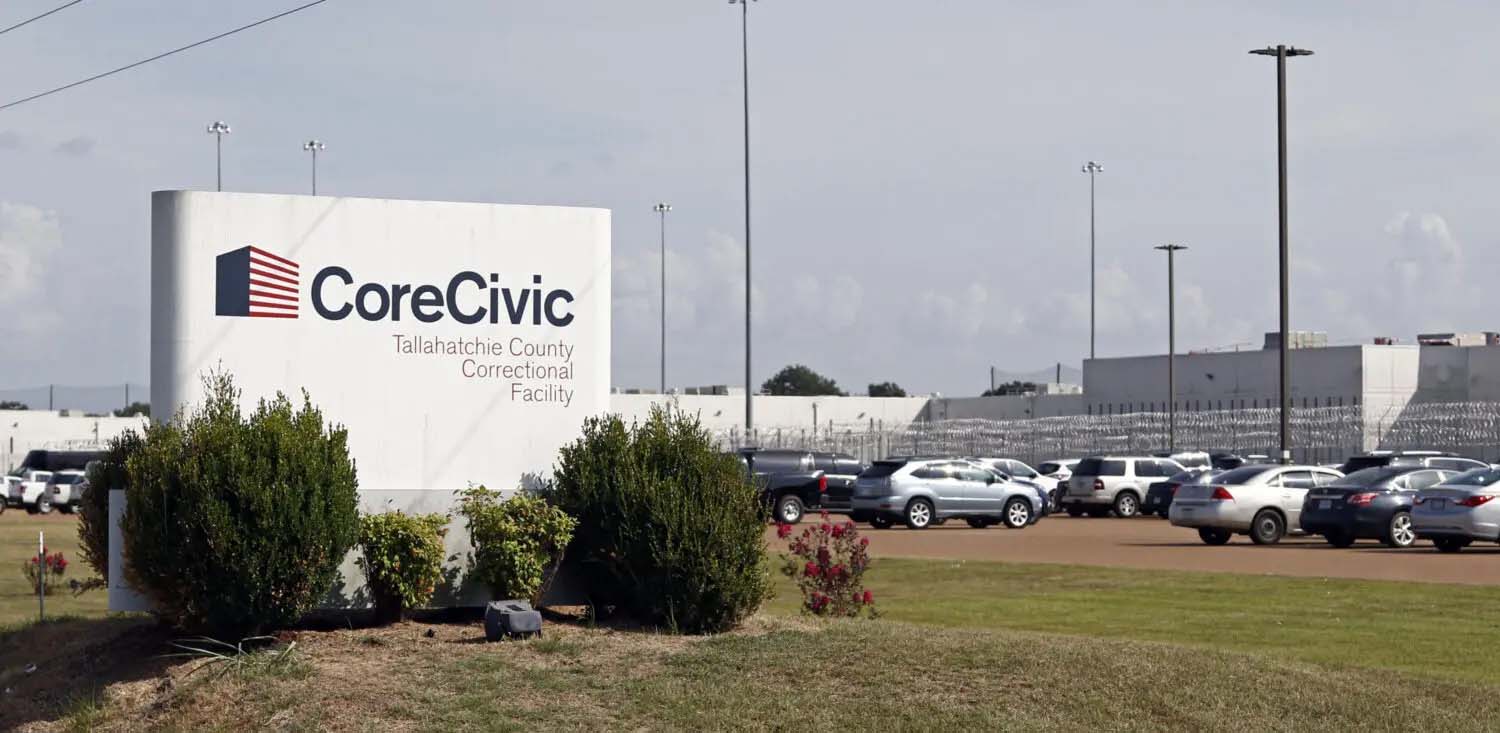From Houston Public Media:
Billie Davis was booked into the Harris County Jail on Valentine’s Day in 2022 for evading arrest.
About two weeks later, he was found unresponsive in a cell at a private prison in Louisiana, nearly 300 miles from home. Less than an hour later, he was dead.
According to a Louisiana coroner’s report, he suffered from “multiple blunt force traumatic injuries” during a fight while in custody. His death was ruled a homicide.
During his brief imprisonment, Davis was transferred to the LaSalle Correctional Center: one of two privately-owned, out-of-state prisons receiving millions of dollars from Harris County to house up to 860 detainees. The county’s reliance on outsourcing is an effort to alleviate chronic overcrowding and understaffing at the Harris County Jail, which state officials and jail reform advocates believe to be the catalyst for an increase in violence and deaths within the facility. These allegations have been outlined in several federal lawsuits against the county.
Additionally, the Harris County Jail has been violating statewide safety standards for the past year and a half now due to inconsistent staffing levels, among other issues.
The first person to reportedly die while in custody at the Harris County Jail this year was 32-year-old Adam Simmons after suffering from “a medical emergency” in February. This comes after at least 19 people died last year. In 2022, at least 27 people lost their lives at the jail — the highest number in nearly two decades, according to county records and data from the Texas Justice Initiative.
Officials like County Judge Lina Hidalgo have repeatedly stressed that they didn’t believe outsourcing is a sustainable solution to the jail’s persistent problems, and yet, just four months ago, they approved another multi-million dollar outsourcing contract, this time with CoreCivic’s Tallahatchie County Correctional Facility in Mississippi.
Even though contracts with private prisons are a Band-Aid for the county’s jail problems, it poses its own set of issues, namely whether enough oversight exists.
During a meeting with state officials in February, Phillip Bosquez, an assistant chief with the Harris County Sheriff’s Office who oversees the county jail, couldn’t give a specific answer when asked about the standards at the Tallahatchie facility.
Duane Lock, a member of the Texas Commission on Jail Standards, asked Bosquez: “Do you have any idea what the standards are in Mississippi as compared to Texas, as far as just ratios or rounds?”
“No, I’m not as well versed as I am with the [Texas] jail commission regulations,” Bosquez replied. “They have some standards.”
The county’s $16.1 million contract with LaSalle states that the LaSalle Correctional facility must comply with “Louisiana’s best practices,” even though the private facility isn’t overseen by the state. LaSalle also operates the Jefferson County Downtown Jail in Texas, which also houses Harris County detainees, although the Jefferson County jail is required to follow Texas’ minimum jail standards.
The county’s $11.3 million contract with CoreCivic states that the Tallahatchie facility — which is not under the purview of the Mississippi Department of Corrections — must operate “in accordance with the American Correctional Association (ACA) standards for adult local detention facilities.”
In addition to internal audits conducted by CoreCivic’s own in-house auditors, the Tallahatchie facility has been subject to “rigorous” on-site inspections by the ACA reviewing “more than 400 standards of correctional management,” and has repeatedly received accreditation from the organization, according to CoreCivic spokesperson Brian Todd.
However, a 2020 congressional investigation found that the ACA’s accreditation system was “riddled with conflicts of interest,” and lacked transparency and accountability.
The American Correctional Association’s ‘dangerous’ accreditation system
The congressional investigation found it’s almost impossible to fail an ACA audit.
According to the 17-page congressional report, the ACA gives private facilities a three-month notice before audits are conducted and provides checklists and mock audits to help facilities prepare. If issues are discovered during an audit, the ACA has the power to “allow a facility to receive accreditation even if it fails to meet minimum standards,” the report read.
“The primary result of the flawed ACA accreditation process is a system that ignores major problems and gives private facilities a free pass, putting the well-being of detainees, prisoners, and corrections professionals at risk,” the report read.
The report also claims the ACA’s dual role as an advocate for the country’s private prison industry and an oversight body for that same industry presents an “irreconcilable conflict of interest.” The investigation found that from 2014 to 2018, almost half of the organization’s $48 million in revenue came from accreditation fees and payments from private prison companies.
“Given its heavy reliance on revenue from the accreditation process, the ACA has a strong financial incentive to not to be too demanding in the accreditation process,” said David Fathi, director of the ACLU National Prison Project.
According to Fathi, the ACA’s accreditation is “essentially meaningless,” allowing private facilities like Tallahatchie to avoid government accountability.
Houston Public Media reached out to the ACA multiple times for comment. We did not receive a response.
A troubled past and a lack of enforcement
Both private companies contracted with Harris County have come under fire over the last few years. CoreCivic, which manages more than 110 facilities across the country, has been accused of falsifying nearly 4,800 hours of staffing records, improperly reporting inmate deaths and mishandling sexual abuse claims. Similar allegations have been leveled against LaSalle, along with claims of medical neglect.
Additionally, LaSalle’s Georgia facility was accused of performing unwanted hysterectomies on female detainees in 2020.
Harris County’s contract with CoreCivic and LaSalle allows the county to conduct quarterly inspections. In an email to Houston Public Media, a Harris County Sheriff’s Office spokesperson said that the agency “maintains regular communication” with all contracted facilities. Additionally, the spokesperson added that each contracted facility adheres to “various standards and best practices,” including regulations set by the ACA.
Notably, the contracts fail to include any kind of enforcement mechanism if standards aren’t met. The only form of enforcement county officials can wield is pulling out of the contracts entirely, although severe overcrowding and understaffing at the Harris County Jail may make this an unrealistic option if other facilities don’t have extra space.
“So what you often have is this situation of very unequal bargaining power, where the agency isn’t really able to meaningfully enforce whatever standards the private prison may have agreed to,” Fathi said. “So, as a practical matter, when a public agency puts prisoners in a private facility, they’re essentially surrendering control over how they’re treated.”
Even at the state level, officials have little authority over how Texas detainees are treated when they aren’t housed in Texas. Brandon Wood, executive director of the Texas Commission on Jail Standards, said he would prefer if Harris County’s detainees were housed in Texas facilities, but ultimately, his “authority ends at the state line.”
Additionally, Wood said he wasn’t well versed with the ACA’s standards and that he couldn’t “speak to their effectiveness or suitability,” but added that he didn’t “believe that an outside set of standards would be better” than Texas’ minimum jail standards.
The county’s contracts with CoreCivic and LaSalle are set to end on Nov. 30 and April 25, respectively, but the county has the option to extend the contracts for four additional one-year terms.
Potential solutions
For years now, advocates like Krishnaveni Gundu, the executive director of the Texas Jail Project, have pushed county officials to lower the jail population by dismissing nonviolent low-level charges.

Incarcerated veterans at the unveiling of the “Brothers in Arms” program at Harris County Jail. Taken on July 25, 2019.
Gundu has previously pointed towards a Justice Management Institute report published in 2020, which recommended the Harris County District Attorney’s Office make “uncomfortable, but necessary changes” by dismissing “all non-violent felony cases older than nine months” in order to alleviate the growing number of pending cases. The report found that of all the county’s felony cases in 2019, about 57% were either dropped or deferred.
“That would immediately take the pressure off the system, both the court backlog and the jail overcrowding,” Gundu said. “That dismissal has to come from the DA’s office.”
However, the DA’s office has repeatedly dismissed the recommendation over the last few years.
Officials have also flirted with the idea of renovating the jail or even building a new facility. The county’s engineering department was conducting a study analyzing the jail’s infrastructure in January, which should also include recommendations for potential upgrades.
For now, Harris County officials seem to be committed to outsourcing people out of Harris County – a temporary solution that even Wood says should continue to be kept “as an option.”
















